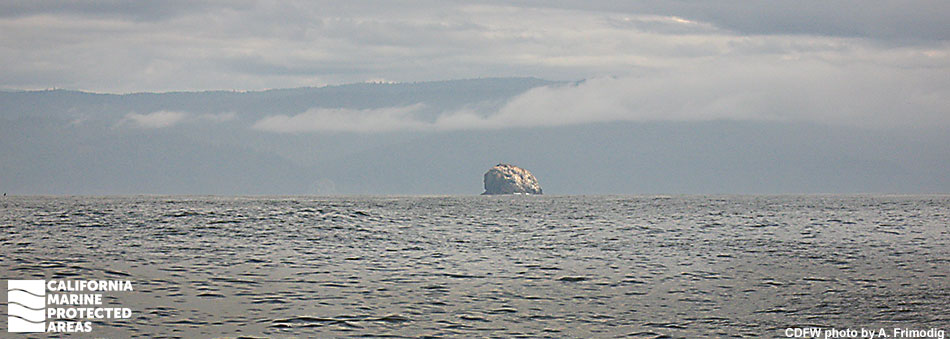Overview

Located offshore near the town of Orick, about 40 miles north of Eureka, Reading Rock State Marine Reserve (SMR) and the adjacent Reading Rock State Marine Conservation Area (SMCA) are Humboldt County’s northernmost marine protected areas (MPAs). The MPAs are named after Reading Rock, a sea stack that rises from the seafloor and stands a fraction of a mile north of the MPAs. Reading Rock SMR protects more than nine square miles of sandy seafloor habitat out to depths of more than 250 feet. Composed predominately of soft, sandy seafloor, species like flatfish, smelt, sea whips, sea pens, and white-plumed anemones are common, while smaller sections of hard, rocky seafloor provide habitat for a variety of rockfish, lingcod, sea cucumbers, sea stars, octopus, and sponges.
Reading Rock SMCA protects nearly 12 square miles of habitat including sandy seafloor and rocky shore environments to depths of more than 160 feet. The SMCA is also home to species found near shore including surfperch and sand crabs, as well as many birds, like western sandpipers, whimbrels, and sanderlings that dine on small sand-dwelling crab and other invertebrates. The SMR prohibits any type of take but visitors may see fishing boats in the SMCA, which allows for the take of salmon, surf smelt, and Dungeness crab, both commercially and recreationally.
Regulations
Reading Rock SMR
It is unlawful to injure, damage, take, or possess any living, geological, or cultural marine resource.
California Code of Regulations Title 14, Section 632(b)(7)(opens in new tab)
Reading Rock SMCA
It is unlawful to injure, damage, take, or possess any living, geological, or cultural marine resource, EXCEPT:
Recreational take of salmon by trolling, surf smelt by dip net or Hawaiian-type throw net, and Dungeness crab by trap, hoop net or hand is allowed. Commercial take of salmon with troll fishing gear, surf smelt by dip net, and Dungeness crab by trap is allowed. Includes take exemptions for the following tribes:
- Cher-Ae Heights Indian Community of the Trinidad Rancheria
- Resighini Rancheria
- Yurok Tribe of the Yurok Reservation
California Code of Regulations Title 14, Section 632(b)(6)(opens in new tab)
Quick Facts
Reading Rock SMR
MPA size: 9.60 square miles
Depth range: 145 to 253 feet
Habitat composition*:
- Rock: 0.24 square miles
- Sand/mud: 9.35 square miles
Reading Rock SMCA
MPA size: 11.96 square miles
Shoreline span: 2.9 miles
Depth range: 0 to 166 feet
Habitat composition*:
- Rock: 1.11 square miles
- Sand/mud: 11.48 square miles
*Habitat calculations are based on three-dimensional area and may exceed the total MPA area listed above.